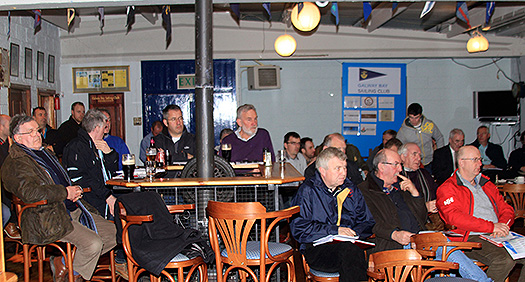#irishsailing – After tweeting 'neither Afloat nor the Irish Sailing Association understand the makeup of sailors in Ireland', author Alex Blackwell gives his personal view on this week's ISA Public Meeting in Galway and on the way ahead for Irish sailing.
Sixty people from as far afield as Dun Laoghaire, from sixteen different sailing clubs, and four training centres converged on Galway Bay Sailing Club on Tuesday February 24th for the final Regional Meeting to discuss the ISA Strategic Plan 2015-2020. Chaired by GBSC's Pierce Purcell (ISA Director) and presented by Neil Murphy (ex ISA President and Chairman of the Planning Group which was operational in the final three months of 2014), the first hour was taken up with a detailed explanation of the Draft Plan, with interjections by Neil Murphy of things that have already been decided should be changed. As he put it, there were many good suggestions made at the previous two meetings, as well as in individual submissions. For the attendees, many of whom had come bearing copious notes, this often meant a reduction of what might need to be brought up.
As Neil Murphy explained, the original list of tasks had taken up over forty pages. This had been whittled down to the document at hand. Some things had been cut that should not have been. One such item was Paralympic Sailing, which as we all know has been cut by the International Paralympic Committee. This has now been reinstated in the ISA plan. It can only be hoped that the ISA will indeed take the IPC and the ISAF Disabled Sailing Committee to task on this.
The plan itself, when finalised before the end of March and voted on in the ISA Annual General Meeting on 28/03/15 in Port Laoise, will constitute the working doctrine for the ISA and its staff right through to 2020. Though 'written in stone' after the AGM, changes may of course be decided on in upcoming AGMs or EGMs.
Neil Murphy made a point of explaining that henceforth any discussion would be about "sailing" as opposed to "the sport of sailing", an issue brought up previously that the Committee felt strongly about. The understanding was that by using the term 'sport', a significant segment of the sailing and boating community was potentially excluded. It was also felt that using this term might be felt by some as elitist and infer that sailing is all about racing. Presumably since this turn of phrase is so deeply ingrained in most sailors, he then went on to almost exclusively refer to 'the sport' or 'the sport of sailing'. But there is hope.
He also brought up that, based on previous input, the ISA had started an initiative with regards to diesel fuel availability. The EU has dictated that leisure craft may only use unmarked (taxed) white diesel. However this is simply not and will not be available with the exception of mere handful of harbours, mostly in clusters around Dublin and Cork, or inland service stations which are inaccessible to visiting boats. Another issue was that the junior sailing programmes would be restructured, with greater emphasis placed on two person boats, and less on the current boat classes.
At the end of his presentation he received a warm round of applause. Almost every subsequent commentator remarked on the excellent work the committee had done in producing this document.
The ensuing discussion, during which some impassioned contributions were made, was not without some serious criticism; similar one might add to what actually happened in Cork. The first point raised was the Small Craft Register, where the ISA had suddenly folded to Government pressure without first ensuring that a working replacement was in place. This is an entirely untenable situation. Irish yachts abroad, and those wishing to go abroad are being forced to flag out to Britain, otherwise they face impoundment, either scenario being undesirable.
Another concern raised was that the stakeholders, key to the growth of sailing, had been omitted in creating a document entirely focussed on clubs, access, training, competition (racing), and culminating in the Olympics. These are the actual members and their concerns, the general public, from whom the clubs (and the ISA) draw their members, and last, but by no means least, the Government. It was pointed out that the RYA's primary focus in their manifesto is "...to ensure that legislators, regulators, and other authorities understand, and take account of, recreational boating activity." It had already been brought up in Cork that the ISA needs to be constantly in the forefront as an advocacy body in respect to sailor's freedoms and interests, and this was reiterated in Galway.
A representation was also made by another significant stakeholder group: the Sailing Businesses. Over-regulated and under-supported, these provide the goods and services all sailors and boaters need; not to mention the innovations required to advance design and technology – a 'minor detail' essential to Ireland being in the forefront of High Performance (Olympic and international class) sailing. This also includes high profile events, such as the Volvo Ocean Race, which came to Galway twice in recent years, producing two of the biggest 'sporting' events in Irish history.
A point that was raised at previous meetings and was brought up again was that the draft plan was all about racing, culminating in 'High Performance'. It was argued that racing sailors were in the minority and that this emphasis was inappropriate. According to statistics issued by the RYA (the ISA has published none) the ratio is 6-1 Club Cruisers to Club Racers. Ireland is likely similar to the UK in this regard. Another observation was that in any given club for every boat going out on the race course between five and ten remained at their mooring or in their slip. Mr. Murphy countered this contending that 60% of sailors in Ireland are racers.
A quick informal survey revealed once again that statistics can always be portrayed in a way that underpins a particular argument. Whereas most cruising boat owners who participate in club racing would consider themselves cruisers, and some racing boat owners would indeed do the same, their respective crew members (up to ten per boat), who only race and rarely have an opportunity to cruise, would almost all consider themselves racing sailors.
Perhaps we can agree that the 'Corinthian' approach would be appropriate: to promote 'sailing' and not harp on racing (as in the draft document) or cruising. We are one community with one goal. We all love sailing and wish to help promote it; be it racing around the cans, coastal cruising, adventure sailing, or simply messing about in boats. This is what needs to be reflected in the plan.
Women sailing also made for some interesting discussion between the floor and the head table. The question was raised why there were only two or three women in a room full of men. The ISA had in the past done some initiatives to get more women sailing. However, as they were implemented, these had been so far from the mark that they had in fact put women off. On the day, the women had to take the helm in a regatta without any prior experience. The 'plan' should, it was subsequently suggested, encourage comprehensive women's sailing programmes. This brought many comments about what good skippers women who actively sail do make.

The attendance at the meeting in Galway Bay Sailing Club included representatives from sixteen clubs in the west and four training centres
Class associations were also represented, and the Mirror was highlighted. Ireland's own Olympian Annalise Murphy 'honed her skills' in a Mirror Dinghy. There are countless Mirrors in sheds and garages nationwide. With the dinghy sailing focus changing to a two person boat, perhaps the clubs could bring these back out into use.
It was also pointed out that more outbound communication (PR) should be done about the high profile events taking place in Ireland, and also the fantastic people we have in the racing, cruising, and adventure sailing scenes. All of these would do a huge job in elevating the public perception of sailing in general and thus also help to promote our ambitions with high profile events like the Olympics.
The bombshell for the majority of those present, not being ISA insiders, arrived when the question of voting rights at the Annual General meeting was raised. Votes are cast en bloc by each club based on their membership (and subscription) levels. The 'Big Six' clubs on the east and south coasts, therefore carry roughly half of the votes, irrespective of who actually attends the meeting.
It is almost impossible for an individual or a small club to have any say. Intentionally or inadvertently, the "block vote" system has the effect of suppressing dissent and perpetuating the status quo. A block vote system like this was used by the trades unions to control the British Labour Party until it was abolished in 1994 in favour of one member, one vote.
Small wonder then, that the smaller clubs, which are the majority of the clubs in the rest of the country, continue to feel under supported and under represented by the ISA. As the main mission of ISA must be to serve its members and to grow interest and participation in sailing in all its forms, the strategic plan must be broadened to encompass all the representative points of view.
Alex Blackwell is an author and sailor who lives on the shores of Clew Bay in County Mayo where he bases his Bowman 57 Aleria.































































